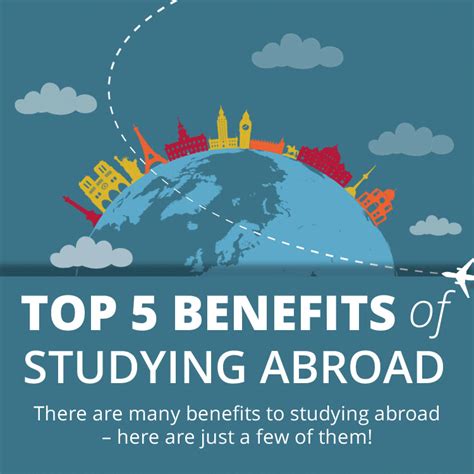Studying abroad is an increasingly popular way for students to gain new experiences, learn about different cultures, and enhance their academic and professional prospects. But how does it actually work? Here’s a step-by-step guide to help you understand the process:

Step 1: Choose a Destination and Program
The first step is to decide where you want to study abroad. Consider your academic interests, budget, and desired travel experience. Research different countries, universities, and programs to find the best fit for you.
According to the Institute of International Education, over 350,000 American students studied abroad in 2019-2020. The most popular destinations include the United Kingdom, Canada, Italy, and Spain.
Step 2: Apply to the Program
Once you’ve chosen a program, you need to apply for admission. Application requirements vary, but typically include transcripts, test scores, letters of recommendation, and a personal statement.
Step 3: Obtain a Visa
If you’re not from the country you’re studying in, you’ll need to obtain a student visa. This involves submitting an application to the embassy or consulate of the host country. Visa requirements vary depending on your nationality and the length of your stay.
Step 4: Prepare for Departure
Once you’ve been accepted to a program and obtained a visa, it’s time to prepare for your departure. This includes booking flights, finding housing, and packing your belongings.
Step 5: Arrive and Settle In
When you arrive in your host country, you’ll need to get your bearings. This includes finding accommodation, opening a bank account, and registering with the local authorities.
Step 6: Take Classes and Immerse Yourself
The academic component of studying abroad is an important part of the experience. Attend classes, participate in discussions, and engage with your professors and classmates.
Step 7: Explore and Travel
Studying abroad is also a great opportunity to explore the host country and its surroundings. Visit local attractions, try new foods, and meet new people.
Step 8: Return Home
After your study abroad experience, you’ll return home with a wealth of new knowledge, skills, and perspectives. Reintegrate into your local community and share your experiences with others.
There are numerous benefits to studying abroad, including:
- Academic Enhancement: Students who study abroad often perform better academically upon returning home. They develop critical thinking skills, problem-solving abilities, and a deeper understanding of global issues.
- Cultural Immersion: Studying abroad provides an immersive experience that allows students to learn about different cultures firsthand. They gain a greater appreciation for diversity and develop a broader worldview.
- Career Advancement: Employers value international experience and cross-cultural competence. Studying abroad can boost your resume and increase your competitiveness in the job market.
- Personal Growth: Studying abroad can be a transformative experience that helps students grow as individuals. They become more independent, confident, and adaptable.
When choosing a study abroad program, there are several factors to consider:
- Destination: Consider your academic interests, budget, and desired travel experience. Research different countries, universities, and programs to find the best fit for you.
- Program Length: Study abroad programs range in length from short-term summer programs to year-long experiences. Choose a program that fits your schedule and academic goals.
- Type of Program: There are many different types of study abroad programs, including traditional academic programs, internships, research programs, and language immersion programs. Choose a program that aligns with your interests and career aspirations.
- Cost: Study abroad programs can vary in cost. Consider tuition fees, housing costs, travel expenses, and other associated costs.
To make the most of your study abroad experience, follow these effective strategies:
- Plan Ahead: Start planning your trip early to give yourself enough time to research programs, apply for admission, and obtain a visa.
- Set Realistic Expectations: Studying abroad is an amazing opportunity, but it can also be challenging at times. Be prepared for culture shock, language barriers, and other unexpected situations.
- Immerse Yourself: Make an effort to fully immerse yourself in the host culture. Attend local events, try new foods, and interact with local people.
- Stay Connected: Keep in touch with friends and family back home, but also make an effort to connect with fellow students and local residents.
- Take Advantage of Resources: Universities and study abroad providers offer a variety of resources to help students succeed. Use these resources to your advantage.
1. How much does studying abroad cost?
The cost of studying abroad varies depending on the program, destination, and length of stay. However, according to the Institute of International Education, the average cost of a study abroad program is between $8,000 and $12,000 per semester.
2. Is it safe to study abroad?
Most study abroad destinations are safe, but it’s always important to research your destination and take precautions. Be aware of your surroundings, avoid dangerous areas, and follow local laws and customs.
3. Can I earn credit for studying abroad?
Yes, most study abroad programs offer students the opportunity to earn academic credit for their coursework. Be sure to talk to your home university to ensure that the credits you earn abroad will transfer back.
4. How can I find financial aid for studying abroad?
There are a variety of scholarships, grants, and loans available to help students finance their study abroad experiences. Be sure to research all of your options and apply for as many scholarships as possible.
5. What are the benefits of studying abroad?
Studying abroad provides students with a unique opportunity to learn about different cultures, gain new skills, and grow as individuals. It can also boost your resume and increase your competitiveness in the job market.
6. How can I apply to study abroad?
The application process for study abroad programs varies depending on the program and destination. However, most programs require students to apply through their home university.
